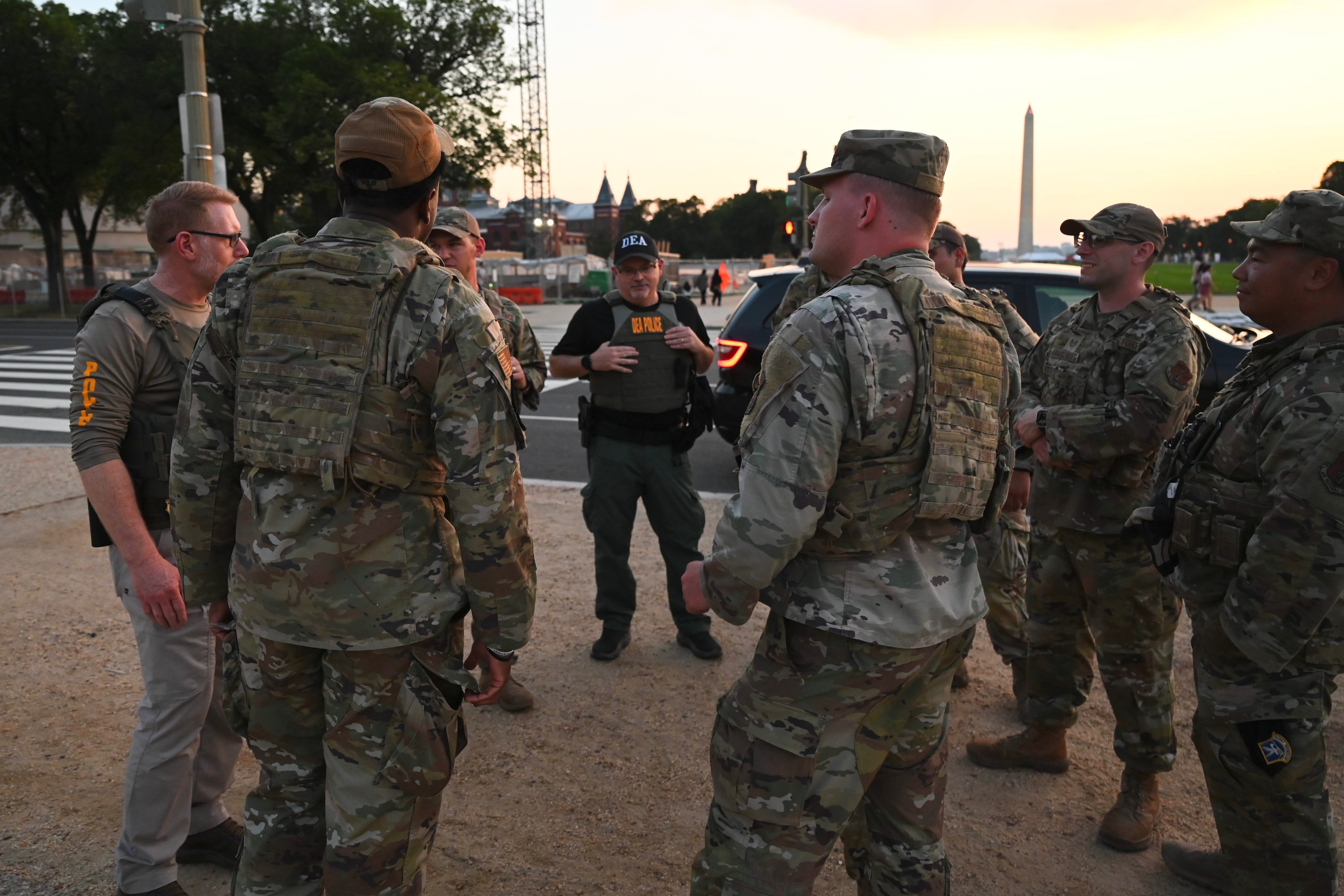Three more states to deploy National Guard to DC

D.C. National Guard soldiers speak with federal agents on the National Mall on Sunday, Aug. 17. DCNG/X
WASHINGTON, Aug. 18 (ZFJ) — Mississippi, Tennessee, and Louisiana have pledged to send National Guard troops to D.C. for policing at the request of President Donald Trump.
Trump has declared a state of emergency due to crime in the nation’s capital and used it as the basis to federalize the district’s civilian Metropolitan Police Department and deploy guard soldiers and federal agents to the streets. An article by the U.S. Department of Defense (DOD) says there are 810 D.C. National Guard soldiers currently on the ground.
Governors are the commanders-in-chief of their state National Guard forces and reserve the power to activate troops for emergencies under Title 32. The president is the commander-in-chief of all military forces of the U.S. and may federalize state guard forces under Title 10, bringing them under federal command, should he find it necessary.
The Posse Comitatus Act explicitly prohibits the regular military forces (like the U.S. Army and U.S. Navy) to be used for domestic law enforcement but makes a single exception for the National Guard in times of emergency.
Mississippi Governor Tate Reeves, a Republican, said on Monday, Aug. 18, that he has approved the deployment of about 200 guard soldiers to be deployed to D.C.
“Crime is out of control there, and it’s clear something must be done to combat it,” said Reeves in a statement. “Americans deserve a safe capital city that we can all be proud of.”
The Associated Press reported Monday that the office of Tennessee Governor Bill Lee, a Republican, said that the state had approved a request from the Trump administration for soldiers.
Louisiana Governor Jeff Landry, a Republican, wrote on X that he had approved the deployment of about 135 guard soldiers to D.C.
The Republican governors of West Virginia, South Carolina, and Ohio have previously pledged 300-400, 200, and 150 guard soldiers respectively. They said that the mission will be funded by the federal government.
The Trump administration has not yet publicly stated why they requested additional guard troops from the states.
So far, Pentagon officials say that the guardsmen will not be armed.
“So, at this time, military members will not be armed, but of course that is — you know, as conditions change, we have the right to adjust force posture as needed, if necessary,” said Pentagon press secretary Kingsley Wilson in response to a reporter’s question on Thursday, Aug. 14. “So, we will continue to work with our federal law enforcement partners to do just that.”
Guardsmen have been spotted at Union Station and on the National Mall, according to video posted on social media. Immigration and Customs Enforcement (ICE) agents wearing masks have also been spotted in various areas making arrests and taking down activists’ posters.
U.S. Attorney General Pam Bondi wrote on X that 137 arrests were made over the weekend, with a total of “nearly 400 arrests” since the federal operation began.
In a press conference on Monday, D.C. Mayor Muriel Bowser said, “The focus should be on violent crime, and that’s what has been promoted, that we’re focusing on violent criminals and violent offenders and violence, and nobody is against focusing on driving down any level of violence. And so if this is really about immigration enforcement, I think the administration should make that plain.”
DOD officials say that the guard will not perform arrests, searches, or direct law enforcement, but instead act as a visible deterrent to crime. The U.S. Marshals Service has been specially deputizing guardsmen, granting them the authority and powers of federal law enforcement officers.
The guardsmen are accompanied by a surge of federal agents as well as the district’s federalized Metropolitan Police Department, which Bondi has ordered to fully comply with federal immigration authorities regardless of any district sanctuary laws prohibiting such compliance.
References
- Mississippi Office of the Governor - Governor Reeves Statement On Mississippi National Guard Deployment to Washington, D.C. - https://governorreeves.ms.gov/governor-reeves-statement-on-mississippi-national-guard-deployment-to-washington-d-c/ (ARCHIVE)
- Governor Jeff Landry - @LAGovJeffLandry (X) - I have approved the deployment of approximately 135 @LANationalGuard soldiers to Washington DC to assist in President @realDonaldTrump’s mission of restoring safety and peace in our nation’s capital. https://x.com/LAGovJeffLandry/status/1957549092562956743
- D.C. Mayor’s Office - @DCMayorsOffice20004 (YouTube) - Mayor Bowser Holds Media Availability, 8/18/25 - https://www.youtube.com/watch?v=gUc3P5S9sQ0
- The Associated Press - 3 more GOP governors authorize deployment of National Guard troops as part of Trump show of force - https://apnews.com/article/washington-dc-federal-police-takeover-national-guard-fb91f9884c928b98036754885a7c0180 (ARCHIVE)
- Attorney General Pam Bondi - @AGPamBondi (X) - Washington, DC is getting safer every night thanks to our law enforcement partners. https://x.com/AGPamBondi/status/1957418256391618696
- U.S. Department of Defense - Guard Assisting Law Enforcement in Making D.C. Safe - https://www.defense.gov/News/News-Stories/Article/Article/4277906/guard-assisting-law-enforcement-in-making-dc-safe/ (ARCHIVE)
- U.S. Marshals Service - @USMarshalsHQ (X) - The U.S. Marshals Service specially deputized National Guard troops, uniting efforts to reinforce safety and security throughout Washington, D.C. https://x.com/USMarshalsHQ/status/1957466011742961851 https://x.com/USMarshalsHQ/status/1957466011742961851
- Jamie Dupree - @jamiedupree (X) - Multiple DC National Guard vehicles at the Lincoln Memorial, which is not a crime area https://x.com/jamiedupree/status/1957170258680205512
- Andrew Leyden - @PenguinSix (X) - The National Guard is now walking patrols in the Washington Metro system. https://x.com/PenguinSix/status/1957462728575963223
- r/washingtondc - u/ikurumba (Reddit) - This doesn’t feel right https://www.reddit.com/r/washingtondc/comments/1mtxdvt/this_doesnt_feel_right/
- Dan Rosenzweig-Ziff - @DanRosZiff (X) - On 14th & R this morning in DC, officers with vests that said only police detained a man who seemed to have been riding a moped, taking him down as passerby screamed. https://x.com/DanRosZiff/status/1956721098533269986
- amanda moore 🐢 - @noturtlesoup17 (X) - Just watched 15 federal agents call an ambulance for a very, very drunk and sick girl in Dupont. https://x.com/noturtlesoup17/status/1956594728176177618
- r/washingtondc - u/Hendrix_Lamar (Reddit) - ICE and MPD arrest 3 people on H and 8th NE Aug 17 between 11am -12:30 pm https://www.reddit.com/r/washingtondc/comments/1msw34x/ice_and_mpd_arrest_3_people_on_h_and_8th_ne_aug/
- 📡 zZz 🛰️ - @station_zzz (X) - Did my late night walk around Columbia Heights. https://x.com/station_zzz/status/1956972851333911019
- U.S. Immigration and Customs Enforcement - @ICEgov (X) - ICE is dedicated to removing criminals from American cities, and D.C. is no exception. https://x.com/ICEgov/status/1957210426111930828
